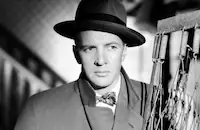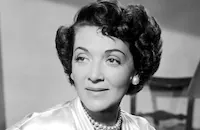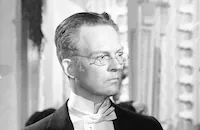Dream Wife

Brief Synopsis
Cast & Crew
Sidney Sheldon
Cary Grant
Deborah Kerr
Walter Pidgeon
Betta St. John
Eduard Franz
Film Details
Technical Specs

Synopsis
While on a business trip to the Middle Eastern country of Bukistan, American salesman Clemson Reade is invited to the home of the Khan of Bukistan. There he meets the Khan's beautiful daughter, the princess Tarji, who performs a seductive dance for him. During the dance, the Khan tells Clemson that Tarji has been "trained" to devote her life to pleasing the man she marries. Clemson is fascinated by prospect of an utterly devoted wife, but he leaves Bukistan the following week to marry his American fiancée, Priscilla "Effie" Effington.
Back in New York, Clemson visits Effie at the State Department, where she works, only to be brushed aside by her attention to an oil crisis. Later that night, Effie spoils a romantic evening planned by Clemson when she tells him that the wedding must be postponed until after the oil deal is signed. When Effie's partner, Walter McBride, drops by to discuss the oil contract, Clemson realizes that his desire for a "full-time wife" cannot be reconciled with Effie's demand for a "part-time husband," and he calls off the engagement. The following day, while meeting with his male colleagues and bemoaning the progress made by women seeking their independence, Clemson hits upon the idea of marrying Tarji, the one woman he knows who was "trained from that day she was born to be a dream wife." Clemson cables a marriage proposal to Tarji, and in three weeks the princess' acceptance arrives with a delivery of goats as her dowry.
Meanwhile, at the State Department, McBride, worried that a misstep by Clemson in the courting of Tarji will result in a collapse of the oil deal, assigns Effie to chaperone the two and ensure that their courtship goes smoothly. Soon after Tarji arrives in New York, Clemson becomes frustrated when he learns that Eastern custom forbids any physical contact with his new fiancée until after their marriage. To make matters worse, Clemson is told that the wedding date has been set by the Khan and that it will not be for another three months. Under Effie's tutelage, Tarji soon learns how to speak English, and appreciate the emancipated life that Western women enjoy. One day, while walking in the city, Tarji meets a number of young men, and innocently leads them to believe that she is available for dates.
Later that night, confusion abounds when the men that Tarji met on the street arrive at her hotel room expecting to spend time with the princess. A fistfight ensues, and Tarji is jailed as a result. Angered by news of the scandal, the Khan rushes to America and announces the end of his daughter's romance with Clemson.
With the oil contract in peril, Effie uses her charm to win the friendship of the Khan, and persuades him to let Tarji marry Clemson. The day before he and Tarji are to marry, however, Clemson rediscovers his love for Effie and decides to break off his engagement. Tarji breaks the engagement first, though, and tells him that she prefers to marry someone that she chooses herself. After extracting a promise from the Khan to sign the oil agreement, Effie turns her attention to Clemson, and the two embrace in a kiss.

Director

Sidney Sheldon
Cast

Cary Grant

Deborah Kerr

Walter Pidgeon

Betta St. John

Eduard Franz

Buddy Baer

Les Tremayne
Donald Randolph

Bruce Bennett

Richard Anderson
Dan Tobin
Movita

Gloria Holden

June Clayworth

Dean Miller

Steve Forrest
Jonathan Cott
Patricia Tiernan
Mary Lawrence
Faire Binney
Dan Barton
Edward Cassidy
Perry Sheehan
Virginia Mullen
Marie Brown
Dick Rich
Bert Moorhouse
Jimmy Moss
Gail Bonney
Lillian Culver
Forbes Murray

Donald Dillaway
Gayne Whitman

John Alvin
Dorothy Kennedy
William Hamel
Allen O'locklin
Aram Katcher
Andre D'arcy

William Mccormick
Bernie Gozier
Mohamed Ilbagi
Jim Cronin
Paul F. Smith
Alphonse Martel
Jack Chefe
Margie Liszt
Charles Sullivan
William Vedder
Vernon Rich
Robert E. Nichols
Dabbs Greer

Kathleen Freeman
Aram Katcher
Rudy Rama
Bob Lugo
Hassan Khayyam
Gordon Richards
Beryl Mccutcheon
Margaret Hedin
Inez Gorman
Jack George
Kay Riehl
Jean Andren
Harry Stanton
Steve Carruthers
James Farrar
Crew
Herbert Baker
Daniel B. Cathcart
Cedric Gibbons
A. Arnold Gillespie
Johnny Green
Arvid Griffen
Sydney Guilaroff
Milton Krasner
Alfred Lewis Levitt
Herschel Mccoy
Warren Newcombe
Loulie Jean Norman
Helen Rose
Conrad Salinger
Dore Schary
Douglas Shearer
Jamshid Sheibani
Sidney Sheldon
Sidney Sheldon
Alfred E. Spencer
William Tuttle
George White
Edwin B. Willis
Charles Wolcott

Photo Collections
Film Details
Technical Specs

Award Nominations
Best Costume Design
Best Costume Design
Articles
Dream Wife
After nearly two decades as one of Hollywood's top leading men, Grant entered the 1950's in a career slump, and he was hoping for the big hit that would restore him to the top rank. Kerr, on the other hand, had been playing elegant patrician beauties since her film debut a dozen years earlier, most recently in period dramas like Quo Vadis (1951) and The Prisoner of Zenda (1952). Tired of what she called "high-minded, long suffering, white-gloved and decorative" roles, she was eager to kick up her heels in a contemporary comedy.
Screenwriter Sidney Sheldon, who had written Grant's 1947 hit, The Bachelor and the Bobby-Soxer, was eager to direct. MGM head of production Dore Schary had produced Bachelor. He agreed that Sheldon's script for Dream Wife was a good vehicle for Sheldon's first directing effort, if Grant would agree to star. Grant did, but Sheldon later recalled that it was a difficult collaboration, because of Grant's fussbudget ways. Grant saw the set for a potentate's palace, and complained, "That's not how it looks in the Middle East!" He refused to take direction from Sheldon, ignoring Sheldon's suggestions and playing scenes his own way. He fussed over details of his costumes, and insisted on changing when co-star Walter Pidgeon showed up in a suit similar to the one Grant was wearing. Sheldon directed only one more film, and went on to produce the TV series, I Dream of Jeannie. He later had a very successful career as a pulp novelist of such bestsellers as The Other Side of Midnight.
Dream Wife producer Dore Schary, in his autobiography, called the film one of MGM's three failures that year (the other two being Bright Road and The Actress), which failed to find audiences, in spite of excellent casts and scripts. He blames the failure of Dream Wife on the fact that it was shot in black and white, although it "cried out for color." He also felt in retrospect that it should have been played more for farce.
Kerr's next film, released just two months after Dream Wife, was also a change from her prim-and-proper image, and a much more successful one. She was nominated for an Academy Award® for her portrayal of the adulterous Army wife in From Here to Eternity (1953). Grant would not be seen onscreen for two years after Dream Wife. But his next film, To Catch a Thief (1955), had all the polish that Dream Wife lacked: the services of one of his favorite directors, Alfred Hitchcock; an elegant script tailored to his suave persona; sumptuous Riviera locations, and Technicolor and VistaVision. Audiences loved it. They also loved the reunion of Grant and Kerr in An Affair to Remember (1957), a tragicomedy of enormous charm and style which has become an enduring classic.
Director: Sidney Sheldon
Producer: Dore Schary
Screenplay: Sidney Sheldon, Herbert Baker, Alfred Lewis Levitt, based on a story by Levitt
Cinematography: Milton Krasner
Editor: George White
Costume Design: Helen Rose, Herschel McCoy
Art Direction: Cedric Gibbons, Daniel B. Cathcart; Set Designer: Edwin B. Willis, Alfred E. Spencer
Music: Conrad Salinger
Principal Cast: Cary Grant (Clemson Reade), Deborah Kerr (Effie), Walter Pidgeon (Walter McBride), Betta St. John (Tarji), Eduard Franz (Khan), Buddy Baer (Vizier), Les Tremayne (Ken Landwell).
BW-100m. Closed captioning.
by Margarita Landazuri

Dream Wife
Quotes
Trivia
Notes
The film's opening credits are presented after a speech delivered by the "Kahn of Bukistan," who addresses the audience in gibberish which is "translated" by subtitles. A 1951 Variety news item noted that M-G-M purchased the story on which this film was based for appoximately $50,000. Sidney Sheldon made his directing and producing debut with Dream Wife, but he is not credited as producer onscreen or in reviews. Hollywood Reporter news items add Ben Astar and James Mitchell to the cast, but their appearance in the final film has not been confirmed. According to a pre-production item in Hollywood Reporter's "Rambling Reporter" column, M-G-M originally sought June Allyson for a leading role. An Hollywood Reporter news item stated that Dimitri Tiomkin would compose the film's score, but Conrad Salinger is credited onscreen with the music. Dream Wife marked the screen debut of stage actress Betta St. John, who changed her name from Betta Streigler.
The file for the film in the MPAA/PCA Collection at the AMPAS Library contains a letter, dated 27 Nov1951, written by Joseph Breen of the PCA and sent to Dore Schary, in which Breen warned the producer that the "basic story" of the script or treatment was in violation of the Production Code. Breen wrote that the presentation of the U.S. State Dept. and the fictitious country of Bukistan constituted a violation of the Production Code. While commending the studio for making it clear that Bukistan was a fictitious country, Breen nevertheless asserted that it was a "rather thin veil" through which it was clear to see that the locale of the story was the Near East. [Both the film and studio publicity identified "Bukistan" as a Middle Eastern country.]
Breen went on to write that the story "ridicules the way of life, the customs, and habits of people unmistakably identified as present day natives of the explosive Near East territory." Although Breen informed Schary in September 1952 that the story, which was probably revised and then resubmitted, seemed to "meet the provisions of the Code," he later appealed to Schary to consider the possiblity that the exhibition of the film might lead to charges that Hollywood was propagandizing. Breen emphasized that the "whole Middle East, predominately Moslem, is in a very touchy state of mind right now." He further noted that the film might "influence public opinion in connection with the troubled question of the State of Israel," and that the charges of propagandizing might result in "serious damage throughout the Moslem world, not only to the company involved, but to our industry in general, and in fact to the whole foreign policy of the United States in that area."
Dream Wife received an Academy Award nomination in the category of Best Costume Design. Several months after the film was released, Sidney Sheldon requested a release from his contract and moved over to Paramount.

Miscellaneous Notes
Released in United States Spring March 1953
Broadcast over TNT (colorized version) September 2, 1989.
Released in United States Spring March 1953














